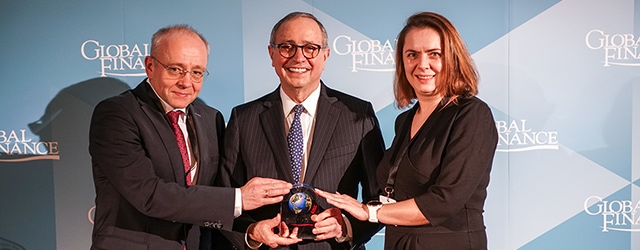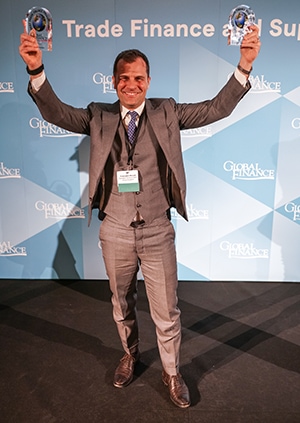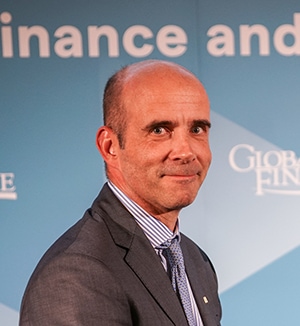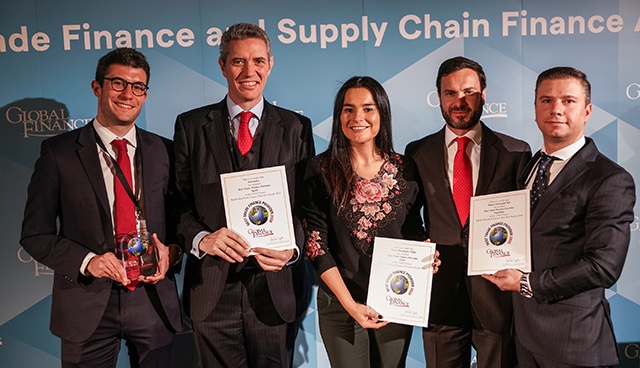Advice, customized solutions and security differentiate the winners in Global Finance’s 20th annual competition.
 Bartlomiej Bartosiewicz (L) and Marta Mroz-Sipiora (R) of Asseco accept the award for Best Use of Artificial Intelligence in Trade Finance from Global Finance publisher Joseph D. Giarraputo (C) |
Trust has always been the basis of the trade finance industry. Finance officials at exporting companies trust their own bank more than they do the remote foreign buyers of their products and services. The letter of credit provides a bridge and offers the safest form of payment in international trade. It has survived the ongoing digital transformation of the industry and has reemerged in electronic form. Automation and the widespread use of templates have vastly improved efficiency and accuracy in processing the backup trade documents.
Meanwhile, the turmoil surrounding the US-China trade war has had a major impact on large Asian companies in particular. They are coping with a host of challenges, ranging from operational disruptions to currency volatility and new scrutiny in critical functions like trade finance, according to a 2019 study by Greenwich Associates. Many of these companies are passing up the rock-bottom prices offered by aggressive new entrants in the market and are willing to pay a premium to gain access to big banks’ international networks and expertise, the Connecticut-based firm says.
 Francesco Miccoli celebrates Standard Chartered’s big wins. |
While noting that companies shopping for a provider still consider pricing and risk appetite, these top criteria are a baseline, with differentiation driven by service capacity. “The new tariffs are forcing companies around the world to reroute supply chains,” the firm says in a release. “Banks with broad networks can play an instrumental role in both finding the right locations and partners, and helping companies finance and execute these changes.”
Meanwhile, the leading trade finance banks are on the verge of transforming their industry from a paper-based system to a more efficient and transparent digitized model with faster and more reliable service. Distributed ledger technology (DLT) is close to making blockchain pilot programs into working versions that will be widely used.
Global Finance editors, with input from industry analysts, corporate executives and technology experts, selected the best trade finance banks in 97 countries and eight regions. In addition, we selected the best bank for trade finance globally, as well as the best banks in various service categories, such as document management and export finance.
The regional and global winners of Global Finance’s 20th annual World’s Best Trade Finance Providers were revealed at an awards luncheon on January 15th in Frankfurt during the BAFT Global Annual Meeting. The winners are the banks that exporters and importers should choose to handle their international trade needs—leaders in developing and taking advantage of new capabilities while also monitoring global trends to deliver clients key insights on both trade and finance.
New global awards were added this year in four categories: Best Trade Finance Provider—Non-Bank, Best Use of Artificial Intelligence in Trade Finance, Best Trade Finance Software Provider and Best DLT Platform for Trade Finance.
|
WORLD’S BEST TRADE FINANCE PROVIDERS 2020 |
|---|
GLOBAL WINNERS | |
|---|---|
Category |
Bank |
| Best Trade Finance Provider — Bank | BNP Paribas |
| Best Trade Finance Provider — Non-Bank | Tradeteq |
| Most Innovative Bank for Trade Finance | Shinhan |
| Best Bank for Commodity Finance | Abu Dhabi Commercial Bank |
| Best Trade Document Management | BNY Mellon |
| Best Bank for Export Finance | Commerzbank |
| Best Bank for Structured Trade Finance | ANZ |
| Best Bank for Trade Finance in Emerging Markets | Société Générale |
| Best Use of Artificial Intelligence in Trade Finance | Asseco |
| Best Trade Finance Software Provider | Finastra |
| Best DLT Platform for Trade Finance | Bangkok Bank |
REGIONAL WINNERS | |
|---|---|
| North America | Citi |
| Latin America | Santander |
| Caribbean | Scotiabank |
| Western Europe | Intesa Sanpaolo |
| Central & Eastern Europe | UniCredit |
| Asia-Pacific | Standard Chartered |
| Middle East | Standard Chartered |
| Africa | Société Générale |
COUNTRY WINNERS | |
|---|---|
| Algeria | Société Générale Algerie |
| Angola | BAI |
| Argentina | Banco Santander Rio |
| Armenia | Converse Bank |
| Australia | ANZ |
| Austria | Raiffeisen Bank International |
| Azerbaijan | Pasha Bank |
| Bahrain | Bank ABC |
| Bangladesh | Standard Chartered |
| Belgium | KBC Bank |
| Bosnia & Herzegovina | UniCredit Bank |
| Botswana | RMB Botswana |
| Brazil | Itaú BBA |
| Bulgaria | United Bulgarian Bank |
| Cambodia | Acleda Bank |
| Cameroon | Société Générale Cameroun |
| Canada | Royal Bank of Canada |
| Chile | Banco Santander Chile |
| China | Bank of China |
| Colombia | BBVA Colombia |
| Côte d’Ivorie | Société Générale Côte d’Ivorie |
| Croatia | Zagrebacka banka |
| Cyprus | National Bank of Greece |
| Czech Republic | CSOB |
| Denmark | Citi |
| Dominican Republic | Banco de Reservas de la República Dominicana |
| Egypt | National Bank of Egypt |
| El Salvador | Banco Cuscatlán |
| Estonia | Swedbank Estonia |
| Finland | SEB |
| France | Société Générale |
| Georgia | TBC Bank |
| Germany | Commerzbank |
| Ghana | Zenith Bank |
| Greece | National Bank of Greece |
| Guatemala | Banco Agromercantil |
| Honduras | Banco Ficensa |
| Hong Kong | DBS Hong Kong |
| Hungary | K&H Bank |
| India | State Bank of India |
| Indonesia | Bank Central Asia |
| Iraq | Trade Bank of Iraq |
| Israel | Bank Leumi |
| Italy | Intesa Sanpaolo |
| Japan | MUFG |
| Jordan | Arab Bank |
| Kazakhstan | Eurasian Bank |
| Kenya | NCBA Bank Kenya |
| Kuwait | National Bank of Kuwait |
| Latvia | OP Corporate Bank |
| Lebanon | BLOM Bank |
| Lithuania | OP Corporate Bank |
| Luxembourg | BGL BNP Paribas |
| Malaysia | Maybank |
| Malta | Bank of Valletta |
| Mauritius | Standard Bank |
| Mexico | BBVA Mexico |
| Mongolia | XacBank |
| Morocco | Société Générale |
| Mozambique | Millennium bim |
| Nambia | First National Bank Namibia |
| Netherlands | ING |
| New Zealand | ANZ |
| Nigeria | Access Bank |
| Norway | DNB |
| Oman | HSBC Oman |
| Pakistan | Meezan Bank |
| Palestine | Bank of Palestine |
| Panama | Bladex |
| Peru | BBVA Peru |
| Philippines | Bank of the Philippine Islands |
| Poland | Bank Millennium |
| Portugal | Novo Banco |
| Qatar | Doha Bank |
| Romania | BRD Groupe Société Générale |
| Russia | VTB Bank |
| Saudi Arabia | SABB |
| Senegal | Ecobank Senegal |
| Serbia | Banco Intesa Beograd |
| Singapore | DBS |
| Slovakia | CSOB Slovakia |
| South Africa | Standard Bank |
| South Korea | Hana Bank (formerly KEB Hana) |
| Spain | Santander |
| Sweden | Handelsbanken |
| Switzerland | UBS |
| Taiwan | Taipei Fubon Bank |
| Thailand | Bangkok Bank |
| Tunisia | Société Générale Tuisie (UIB) |
| Turkey | Garanti Bank |
| Ukraine | Raiffeisen Bank Aval |
| United Arab Emirates | First Abu Dhabi Bank |
| United Kingdom | NatWest |
| United States | Citi |
| Uruguay | Banco Itaú Uruguay |
| Uzbekistan | Hamkorbank |
| Vietnam | VietinBank |
U.S. REGIONAL WINNERS | |
|---|---|
| New England | Webster Bank |
| Mid-Atlantic | M&T Bank |
| Great Lakes | KeyCorp |
| Plains | Commerce Bank |
| Southeast | SunTrust Bank |
| Southwest | Comerica |
| Rocky Mountain | Zions Bancorp |
| Far West | U.S. Bancorp |
Methodology
Global Finance editors select the winners for both the Trade Finance Awards and the Supply Chain Finance Awards with input from industry analysts, corporate executives and technology experts. The editors also use entries submitted by financial services providers, as well as independent research, to evaluate a series of objective and subjective factors. This year’s ratings, which covered 97 countries and eight regions, were based on performance during the period from the fourth quarter of 2018 through the third quarter of 2019.
It is not necessary to enter in order to win, but experience shows that the additional information supplied in an entry can increase the chance of success. In many cases, entrants are able to present details and insights that may not be readily available to the editors of Global Finance.
The winners are those banks and providers that best serve the specialized needs of corporations as they engage in cross-border trade. The winners are not always the biggest institutions, but rather the best—those with qualities that companies should look for when choosing a provider.
Global Finance uses a proprietary algorithm with criteria—such as knowledge of local conditions and customer needs, financial strength and safety, strategic relationships and governance, competitive pricing, capital investment and innovation in products and services—weighted for relative importance. Each entity is rated on each separate criterion. The algorithm incorporates those ratings into a single numeric score, with 100 equivalent to perfection. In cases where more than one institution earns the same score, we favor local providers over global institutions, and privately owned banks over government-owned ones.BAL WINNERS
|
GLOBAL WINNERS |
|---|
 Vincent Davignon of BNP Paribas |
BEST TRADE FINANCE PROVIDER—BANK
BNP Paribas
More than 40,000 corporations around the world rely on BNP Paribas for trade-related advice and operating capabilities, including customized solutions to optimize working capital. The French bank operates more than 100 trade centers in 60 countries, which serve as corporate entry points for all trade needs. Centric, BNP Paribas’ client platform for treasury operations, provides access to all of the bank’s services, including trade finance, supply chain and cash management.
The bank’s dedicated trade centers are staffed by 350 multilingual trade experts. An additional 1,200 middle- and back-office employees complete the bank’s trade team, which handles 14 million trade-related transactions annually.
BNP Paribas is one of the founding members of Voltron, the open platform for documentary trade. The bank has also entered a partnership with Cashforce, a fintech, to offer digital cash flow forecasting and working capital services to corporate treasurers. Greenwich Associates has named BNP Paribas as a quality leader in trade finance in parts of Europe and Asia..
BEST TRADE FINANCE PROVIDER—NON-BANK
Tradeteq
With a raft of new providers entering the bank-dominated trade finance industry, Global Finance thought it was time to acknowledge these relative newcomers’ contribution to one of the oldest businesses in banking. For the first time, we are awarding a nonbank provider a top honor in this year’s Trade Finance Awards. Tradeteq is a London-based marketplace that uses machine learning and nontraditional data sets to help institutional investors build better-informed risk models and credit-scoring tools for investing in and monitoring portfolios of trade finance assets. Tradeteq’s objective is to increase participation by pension funds and insurance companies in this growing asset class and to turn trade finance assets into investment products that have a positive knock-on effect on capital-markets liquidity. It’s a timely goal: In 2016, the Asian Development Bank identified a $1.5 trillion trade financing gap in developing markets. Attracting new classes of investor can only be a good thing, given this unmet need.
 Joohyuck Choi of Shinhan Bank |
MOST INNOVATIVE BANK FOR TRADE FINANCE
Shinhan Bank
The South Korean economy is highly dependent on trade. Shinhan Bank was the first in the country to introduce a global transaction banking unit, in 2017. More recently, the bank has been strengthening its efforts to provide digital solutions in trade finance. Internally at the bank, documentation for trade finance is managed through robotic process automation; and Shinhan Bank is preparing artificial intelligence-based document screening for global sanctions. The bank is also participating in diverse consortia and pilot projects involving new technologies. To help “export rookie” companies to explore overseas markets, Shinhan provides free short-term export credit insurance in partnership with the Korea Trade Insurance Corporation, known as K-Sure. The bank has 162 branches in 20 countries.
BEST BANK FOR COMMODITY FINANCE
Abu Dhabi Commercial Bank (ADCB)
ADCB holds a significant share of the trade finance market in the United Arab Emirates. Its clients are some of the largest exporters globally in the petrochemical industry. The bank developed remote presentation to facilitate the day-to-day use of trade export bills. ProTrade, the bank’s digital trade finance platform, includes a live dashboard of all transactions and can be used to generate customized reports. ADCB handles trade transactions in 30 currencies. In September 2019, it moved $6.5 million of Canadian wheat to Bangladesh using an end-to-end blockchain transaction via a distributed ledger platform in Singapore.
BEST TRADE DOCUMENT MANAGEMENT
BNY Mellon
BNY Mellon processes trade documents worldwide through a broad branch network, using scanning and digitization to deliver trade documents between exporters, importers and their bankers. BNY Mellon’s overnight document-examination service for import and export letters of credit enables clients to improve their turnaround times, reduce costs and add processing capacity when existing examiners’ resources are strained. It is also working on a proof of concept for the use of artificial intelligence (AI) for trade sanction filtering, and testing the harnessing of AI and robotics to read trade documents in a structured format and feed the information into its compliance system.
BEST BANK FOR EXPORT FINANCE
Commerzbank
Commerzbank, Germany’s leading trade finance bank, settles $55 billion worth of trade annually. With a local presence in 50 countries, Commerzbank helps corporations minimize trading risks and enter new markets. The bank annually processes more than $33 billion in letters of credit (L/Cs), the safest form of payment processing in international trade. Its three dedicated trade-processing centers in Europe and Asia process L/Cs 18 hours a day, five days a week. Commerzbank also offers a documentary collection service to provide security when dealing with foreign companies. Under the framework of an agency agreement, the participating banks deliver the documents for obtaining the goods to the importer in accordance with the conditions stated in the collection order, but without assuming any obligation.
BEST BANK FOR STRUCTURED TRADE FINANCE
ANZ
With its army of 600 trade specialists, ANZ provides a comprehensive range of trade services, from traditional documentary trade finance to highly diverse, structured solutions. The bank’s commodity trade specialists offer bespoke solutions for high-value flows structured around the supply chain and the commercial terms of customers. Each financing arrangement is tailored to the particular needs of the client. ANZ also arranges export credit agency enhanced financing for imports. While many trade facilities are self-liquidating, ANZ seeks to build long-term relationships by delivering innovative solutions. The bank helps companies to free up cash from their working capital to improve efficiencies.
 Ender Tanar (L) and Andrew Hale (R) of ANZ |
BEST BANK FOR TRADE FINANCE IN EMERGING MARKETS
Société Générale
Société Générale’s global transaction banking network spans more than 50 countries, including 19 in Africa and 13 in Central and Eastern Europe. The bank offers a wide range of advisory services and tailored solutions to secure transactions and protect client assets. In partnership with South Africa-based Absa Group, Societe Generale has created a pan-African service and product offering with simplified engagement across the continent. Absa is present in 12 African countries, primarily in eastern and southern parts of the continent; whereas Societe Generale’s presence is mainly in West and North Africa. In the CEE, SG’s Czech Republic-based Komercni banka, with 365 branches, is the French bank’s most important member. BRD Societe Generale is the leading bank for import letters of credit and factoring in Romania. SG’s majority-owned Rosbank is the among the leading private banks in Russia.
BEST USE OF ARTIFICIAL INTELLIGENCE IN TRADE FINANCE
Asseco
This Polish software company has developed a proof-of-concept for a solution that uses the Digitrade digital asset exchange to provide a more user-friendly and less time-consuming digital support function for sending trade documents to banks. The solution uses artificial intelligence to help decision-makers more easily compile risk analytics for reviewing trade finance transactions. “Our solution is real-time and helps the bank more efficiently detect transactions with potential compliance concerns upfront,” says Asseco. “What is more, the Digitrade solution assists in managing and comparing a large number of data points across current and prior transactions, which will provide more context and usable data to aid the decision-maker in reviewing global trade transactions.” The solution will be available via Asseco’s Enterprise Banking Platform for corporate customers and its Advisory Banking Platform system for bank advisers, employees and back offices.
BEST TRADE FINANCE PROVIDER—BANK
BNP Paribas
More than 40,000 corporations around the world rely on BNP Paribas for trade-related advice and operating capabilities, including customized solutions to optimize working capital. The French bank operates more than 100 trade centers in 60 countries, which serve as corporate entry points for all trade needs. Centric, BNP Paribas’ client platform for treasury operations, provides access to all of the bank’s services, including trade finance, supply chain and cash management.
The bank’s dedicated trade centers are staffed by 350 multilingual trade experts. An additional 1,200 middle- and back-office employees complete the bank’s trade team, which handles 14 million trade-related transactions annually.
BNP Paribas is one of the founding members of Voltron, the open platform for documentary trade. The bank has also entered a partnership with Cashforce, a fintech, to offer digital cash flow forecasting and working capital services to corporate treasurers. Greenwich Associates has named BNP Paribas as a quality leader in trade finance in parts of Europe and Asia..
BEST TRADE FINANCE SOFTWARE PROVIDER
Finastra
Formed in 2017—when Vista Equity Partners, a private equity firm, merged Misys and Canadian software provider D+H—Finastra has a strong track record in trade finance. Its trade and supply chain software solutions enable hundreds of banks to more easily leverage the latest technologies, including cloud computing, advanced data analytics, big data, application programming interfaces and distributed ledger, to digitize their trade finance business and enhance user experience for their corporate customers.
BEST DLT PLATFORM FOR TRADE FINANCE
Bangkok Bank
Bangkok Bank was an early proponent of blockchain technologies, joining the R3 bank-led distributed ledger technology (DLT) consortium in 2016. Recognizing the potential for DLT to improve efficiency and transparency and reduce costs in the complex, manual world of trade, it will also “bring new opportunities to smaller customers who up until now have not been able to participate in international trade due to barriers to entry,” the bank says. Bangkok Bank is currently testing DLT for letters of credit and open account trade using R3’s Corda platform. Last year, it piloted what it claims was the first trade finance transaction within Asean to use documentary credit through DLT, involving customers in Indonesia and Thailand. It plans to extend DLT to other parts of the supply chain as well.
|
REGIONAL WINNERS |
|---|
NORTH AMERICA
Citi
Citi Treasury and Trade Solutions (TTS) provides integrated cash management and trade finance services to major participants in global markets, leveraging the bank’s unmatched global network. Citi TTS offers an extensive range of trade services, including trade finance, supply chain finance, and export and agency financing. Citi is able to capture clients’ end-to-end cross-border trade flows with a single global platform. The bank has continually boosted investment in technology to support trade innovation and advancement of its capabilities. Recent enhancements include an upgraded user interface, a new global program dashboard and a seamless platform linking Citi Supplier Finance with WorldLink, a cross-currency payments tool. The bank’s network and technology are centrally owned and managed, allowing it to provide consistent platforms and interfaces around the world and to introduce upgrades with minimal disruption.
LATIN AMERICA
Santander
Spain-based Santander has more than 350 trade finance professionals in Latin America, where it offers a large range of trade and working capital solutions. In Mexico, it is the leading bank for standby letters of credit (L/Cs), with about a 30% market share. In Argentina, Santander Rio is the top trade bank, with a 19% market share. The bank has its own local platform, which enables it to adapt quickly to the changing political and economic situation of the country. In Brazil, Santander has played a significant role with import L/Cs in the retail and industrial segments. Santander also has a 19% market share in Chile. Its emerging franchises in Peru, Colombia and Uruguay are growing at annual rates of more than 100%.
 From left to right: Pablo Ballesteros, Rafael Santamaria, Carla Dodds, Javier Carralero, and Kiril Emilov Pantev from Santander accept the award |
CARIBBEAN
Scotiabank
Scotiabank, Canada’s most international bank, has specific local expertise in the Caribbean, where it is present in more than a dozen jurisdictions, from the Bahamas to Curaçao, and is currently in the process of focusing its presence in the region. The bank’s self-service trade finance portal provides online access for processing letters of credit, guarantees and inquiries. Scotiabank employs more than 500 trade finance professionals worldwide. The bank’s local knowledge, skills and on-the-ground presence enable it to remove many of the obstacles inherent in international trade and provide clients with fast and efficient service. Scotiabank has been active in Caribbean markets for more than a century.
WESTERN EUROPE
Intesa Sanpaolo
Italy’s second-largest bank, Intesa Sanpaolo, is among the leading banking groups in the eurozone. Its corporate and investment banking division has a direct presence in 25 countries. The Global Transaction Banking department, created a few years ago, now employs more than 300 people. In the last four years, Intesa Sanpaolo has been working on a dedicated project known as Automated Workflow for Trade Finance to optimize the processing of documentary credits. In January 2019, the bank teamed up with Orbian to offer its customers a solution for receivables financing. The new confirming platform provides coverage for global supply chains, reaching suppliers in more than 50 countries. In late 2019, Intesa Sanpaolo launched Exetra, a trading company, which operates as an intermediary by purchasing goods from a producer and selling them to a foreign buyer, thereby becoming the “exporter” and taking charge of all the details of the deal, enabling the producer to expand abroad.
CENTRAL & EASTERN EUROPE
UniCredit
Pan-European UniCredit serves 1,500 multinational companies through its corporate and investment bank. The Italy-based bank is the number one international commercial bank in the CEE region, where it is the largest lender and has a presence in 14 countries. UniCredit has more than 200 trade professionals in the CEE, most of whom are certified as documentary credit specialists. The bank offers strong expertise in structuring transactions and providing tailor-made and technologically advanced products. It is continuing to migrate its corporate clients to UC Trade Finance Gate, a single point of access for trade finance. Globally, UniCredit provides access to a network of 4,000 correspondent banks covering approximately 175 countries.
ASIA-PACIFIC
Standard Chartered Bank
Standard Chartered is the leading trade bank in the Asia-Pacific region, where it is present in 22 countries. The UK-based bank is the cross-border trade market leader among international banks in China. It also has the leading trade finance market share in Hong Kong and is the largest international bank in India. In October 2019, Standard Chartered and the IFC, a member of the World Bank Group, established a $1 billion facility to boost trade finance in emerging markets. This risk-sharing arrangement is expected to enable more than $4 billion in trade finance over a three-year period. Standard Chartered is also a leader in trade digitization efforts and is a member of multiple banking consortia seeking to leverage distributed ledger technology.
Middle East
Standard Chartered
With an on-the-ground presence in the United Arab Emirates, Jordan, Bahrain, Qatar, Oman and Iraq, Standard Chartered has a strong understanding of markets in the Middle East. The bank’s extensive product capability includes a suite of Islamic banking products, as well as sophisticated structuring capability for complex cross-border trade deals. Standard Chartered is the leading bank in export finance in the region through large bank lines and a competent trade-advisory team. The bank uses smart trade-application forms to improve process efficiency. More than 35 products are bundled with its cash management and foreign exchange capabilities.
Africa
Société Générale
Société Générale is one of the most established international banks in Africa, with a network of 1,000 branches in 19 countries serving 150,000 corporate clients. The bank has created five regional management hubs on the continent and is the leading bank in Côte d’Ivoire, Cameroon, Senegal and the West African Economic and Monetary Union. Societe Generale offers products designed specifically for Africa, including regional cash pooling, investment banking and renminbi settlements, as well as solutions for small and medium enterprises. It has deployed an electronic trade tool across all of its African subsidiaries to digitize the exchange of guarantees.



